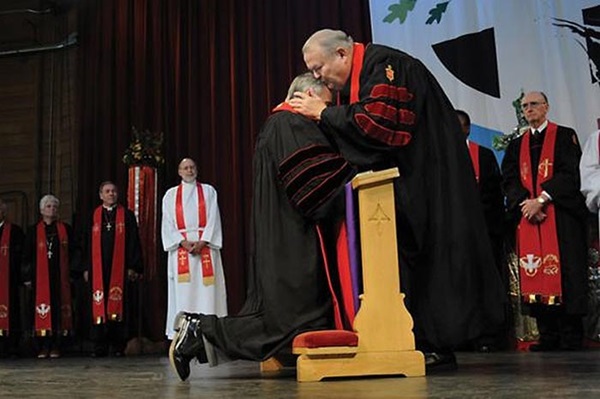While the U.S. political scene focuses on who is winning red and blue states, many United Methodists votee on who will wear the purple.
This Summer, the five U.S. jurisdictional conferences elected bishops. The gatherings also finalized the next assignments for a number of already active episcopal leaders. In addition, two of the meetings took up proposals on consolidating conference boundaries.
The United Methodists who vote on bishops include General Conference delegates and other church leaders.
Each conference elects twice as many delegates to jurisdictional conferences as they do to the denomination's top lawmaking body. That means a total of 1,008 delegates voted this Summer for U.S. bishops. The delegates include an equal number of laity and clergy.
All newly elected U.S. bishops will took office Sept. 1.
United Methodist bishops do not wear miters or special robes. Their main distinctive garment is a simple purple clergy shirt. While limited in fashion choices, bishops do wear multiple hats, metaphorically speaking.
Bishops are elders "set apart for a ministry of servant leadership, general oversight and supervision," states the Book of Discipline, the denomination's governing document.
United Methodist bishops appoint clergy. They also are the first stop when clergy face complaints under church law.
They oversee general church agencies as board members and sometimes agency presidents. They represent the denomination in ecumenical and interfaith relationships. They also frequently represent the church in the wider community and before state and national governments.
This new class of bishops, at least in the near future, will have an additional task.
General Conference 2016 in May gave the Council of Bishops authority to name a special commission that will review and possibly recommend revisions to church teachings related to human sexuality.
The hope is to keep a deeply divided denomination united.
"This new class of bishops will bring important perspective and experience to the council's work related to implementing the proposal," said Dakotas-Minnesota Area Bishop Bruce Ough, the Council of Bishops president.
Heather Hahn, multimedia news reporter, United Methodist News Service
One of seven apportioned giving opportunities of The United Methodist Church, the Episcopal Fund pays for bishops' salaries, office and travel expenses, and pension and health-benefit coverage. Please encourage your leaders and congregations to support the Episcopal Fund apportionment at 100 percent.





